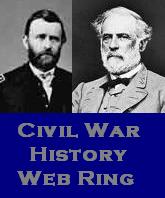I generally don't feature Confederate cavalry leaders, but in this individual's case, he relates to the current thread of posts on the Regiment of Mounted Rifles/ 3rd U.S. Cavalry and had a very colorful career, so I decided to make an exception.
William Wing Loring was born in Wilmington, North Carolina on December 4, 1818. The family moved to St Augustine, Florida when he was four, and he spent the rest of his childhood in that state.
His military service started at the tender age of fourteen, when he enlisted in the Florida militia to fight against the Seminole Indians at the beginning of the Seminole Wars. He eventually rose to the rank of second lieutenant in the militia. He attempted to run away to fight in the Texas War for Independence as a seventeen year old, but was prevented by his father.
After attending a boarding school in Alexandria, Virginia for his secondary education, William attended Georgetown University before going on to study law. He was admitted to the Florida bar in 1842. He was elected to the Florida House of Representatives in 1843, and unsuccessfully ran for the Florida Senate in 1845.
The outbreak of the Mexican War rejuvenated Loring's fortunes. He joined a newly formed regiment, the Regiment of Mounted Rifles, as a captain, receiving his appointment on May 27, 1846. Originally organized to protect the Oregon Territory, the regiment was diverted for service in the Mexican War. Loring's prior military service apparently served him well, as he was promoted to major on February 16, 1847, prior to the regiment seeing its first combat. His regiment fought in most of the battles of the war, and Major Loring was wounded three times. His third wound came at the head of his regiment leading the charge into Mexico City, and resulted in the amputation of his arm. He was brevetted lieutenant colonel on August 20, 1847 for gallant and meritorious service in the battles of Contreras and Churubusco, and colonel on September 13, 1847 for similar service at the battle of Chapultepec.
After the war, Loring commanded the Oregon territory for two years during the California Gold Rush. He was promoted to lieutenant colonel on March 15, 1848. His next assignment was to the frontier of Texas and New Mexico Territory, where he served for five years against the Comanche, Apache and Kiowa Indians. At the time he was promoted to colonel on December 30, 1856 at age 38, he was the youngest full colonel in the Army.
In 1859, Colonel Loring was sent to Europe to study the military tactics of foreign armies and lessons learned from the Crimean War. He visited 10 different countries, including Turkey and Egypt.
At the outbreak of the Civil War, Loring decided his loyalties lay with the South. He resigned his commission on May 13, 1861, and volunteered for service in the Confederate Army. He was commissioned as a brigadier general almost immediately and assigned to command the "Army of the Northwest" in western Virginia. His first campaign was against Major General George McClellan's forces invading from Ohio. After this campaign, General Loring and his men served in the western theater of the war. During the Vicksburg campaign, his forces were cut off from the rest of the Confederate army at the battle of Champion Hill. He marched south and joined his troops to the forces under General Joseph E. Johnston. He served in the corps of General Leonidas Polk afterwards, and commanded the corps briefly after Polk was killed at the battle of Pine Mountain. Wounded a fourth time during fighting at Ezra Church, General Loring did not return to action until after the Atlanta campaign. Upon his return, he fought first with General Hood at Franklin and Nashville, then joined Johnston's forces in the Carolinas.
After the war, Loring tried his fortunes overseas. He was one of fifty Civil war veterans recommended by General Sherman to the Khedive of Egypt to modernize his army. General Loring initially served as the army's Inspector General, and later commanded the country's coastal defenses. In 1875, he served as the chief of staff for an Egyptian pasha during an invasion of Abyssinia. When the invasion failed, the Americans were blamed for the failure. The American officers were dismissed in 1878, but not before Loring had attained the rank of Fereek Pasha, the equivalent of Major General in the U.S. Army.
Returning to the United States, Loring ran unsuccessfully for the United States Senate from Florida. After his defeat he moved to New York City, where he wrote a book on his experiences in Egypt which was published in 1884.
William W. Loring died on December 30, 1886, and is buried in Woodlawn Cemetery, St. Augustine, Florida
Tuesday, September 22, 2009
Subscribe to:
Post Comments (Atom)


No comments:
Post a Comment